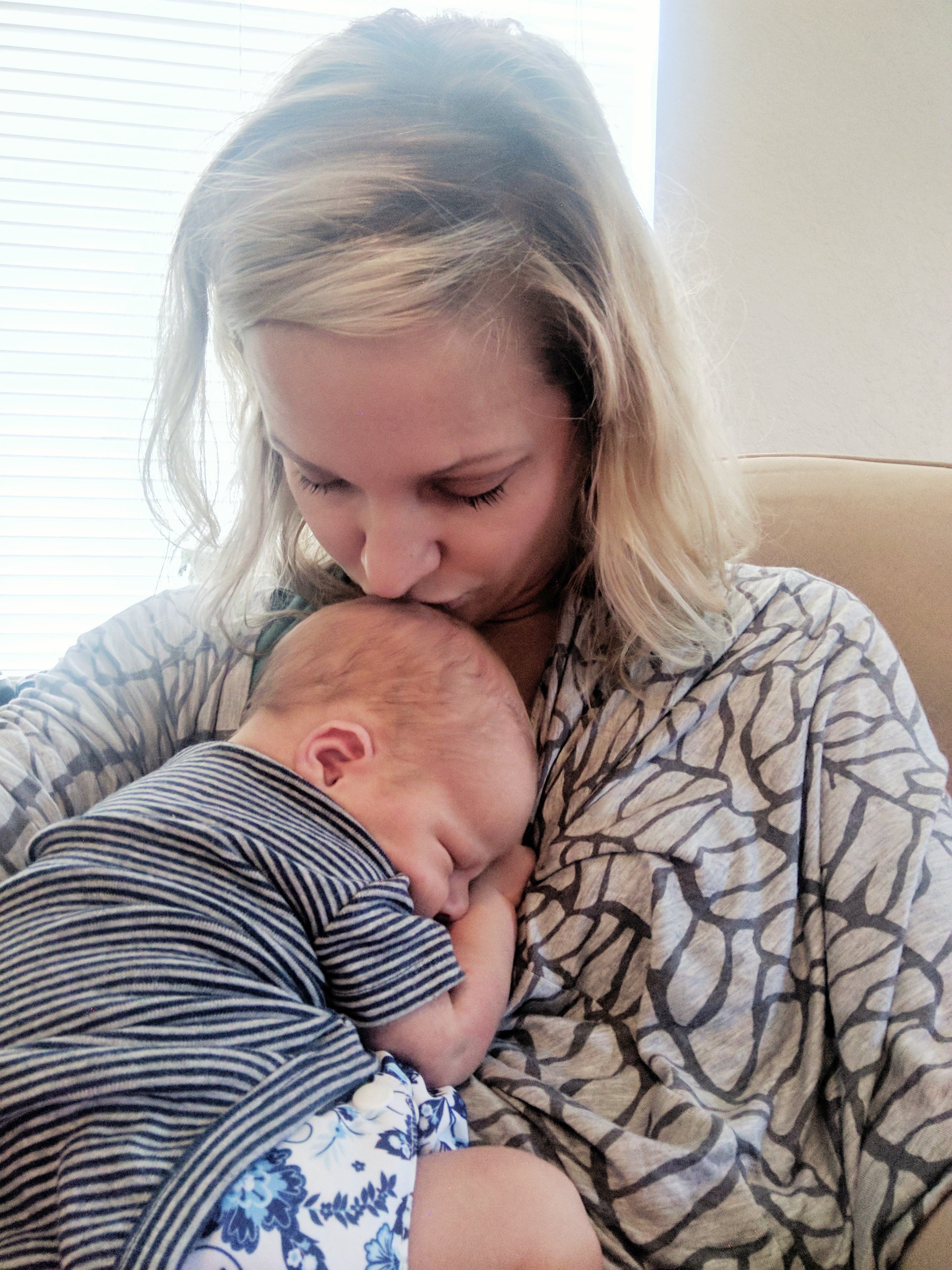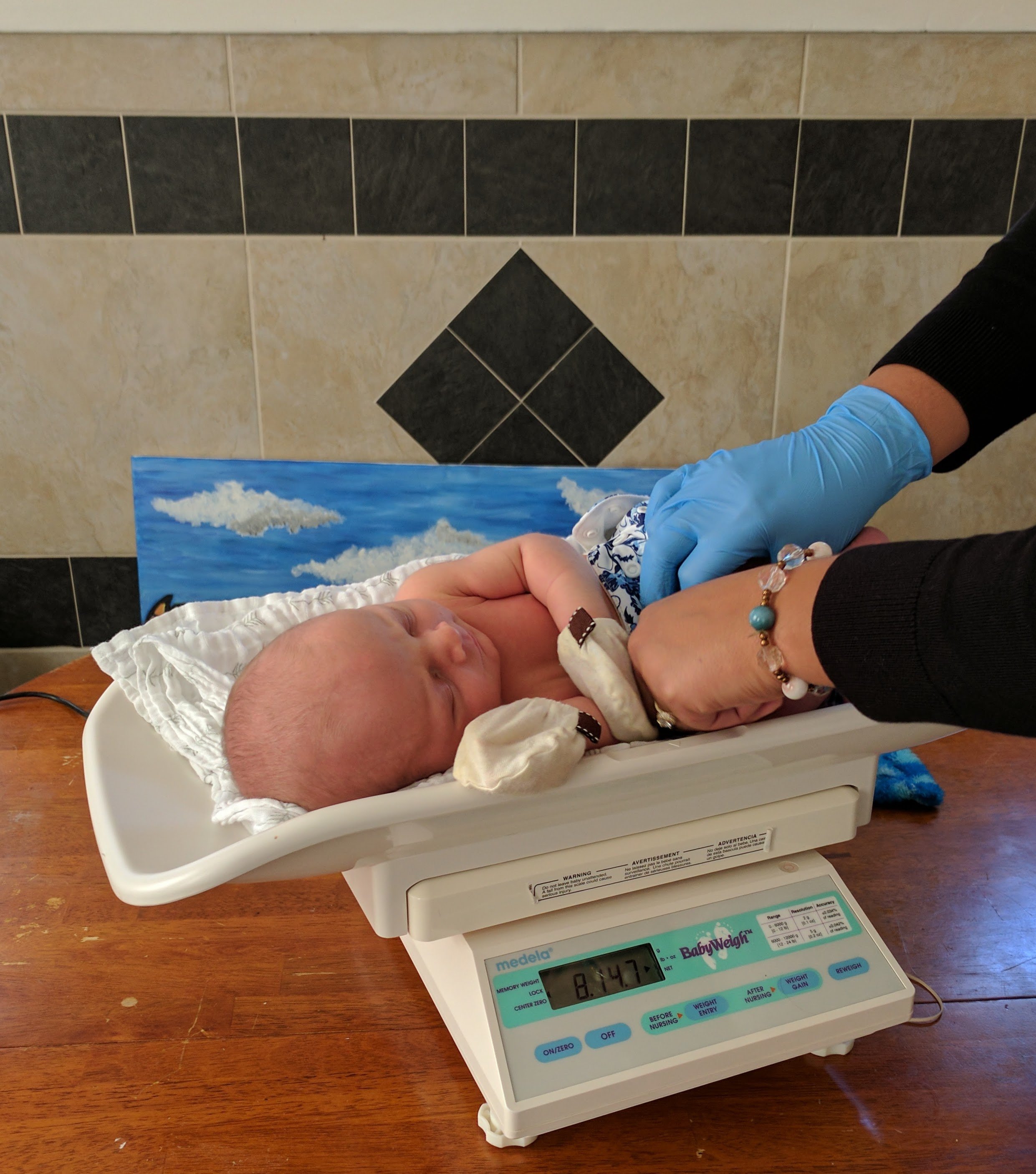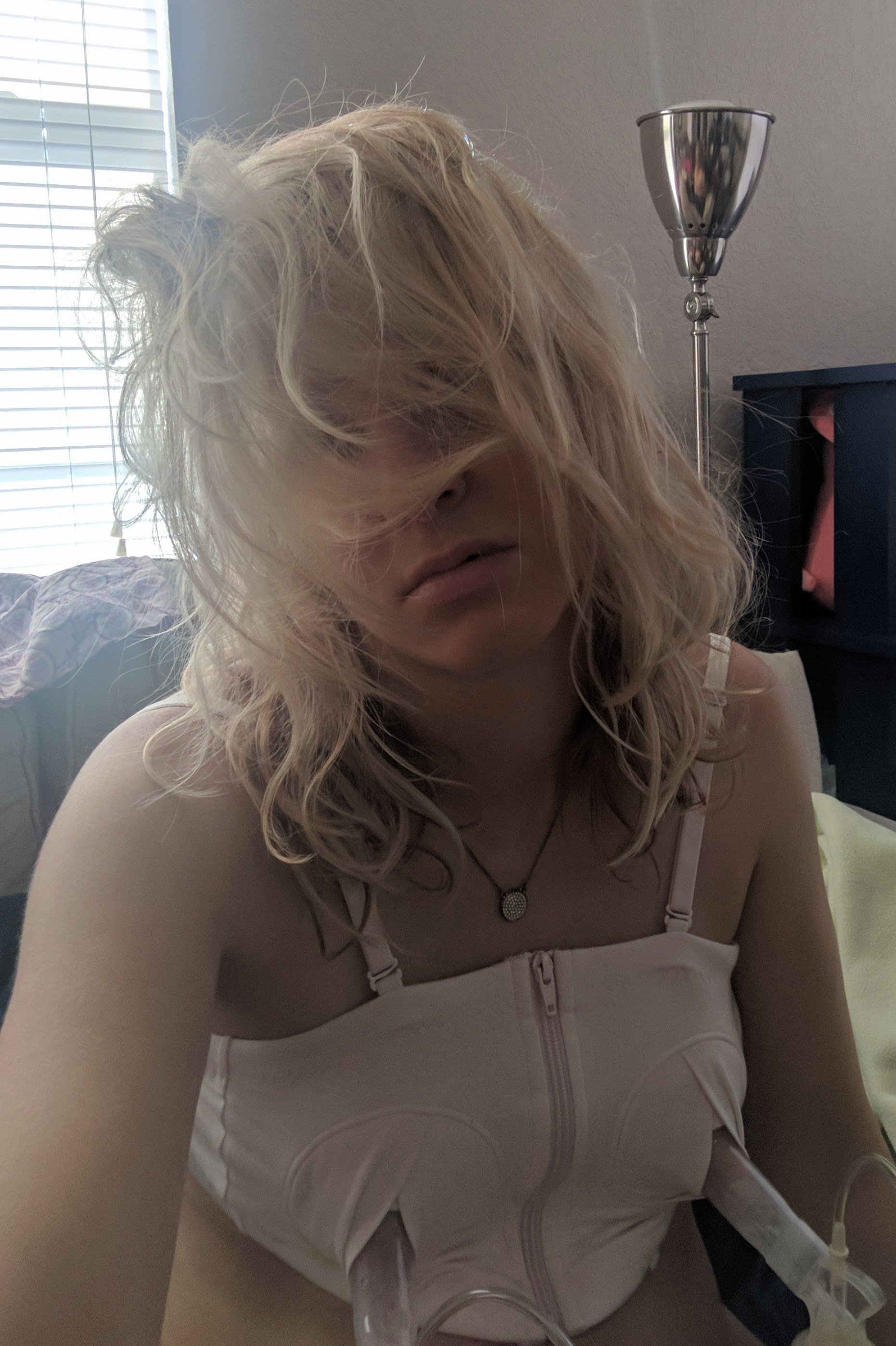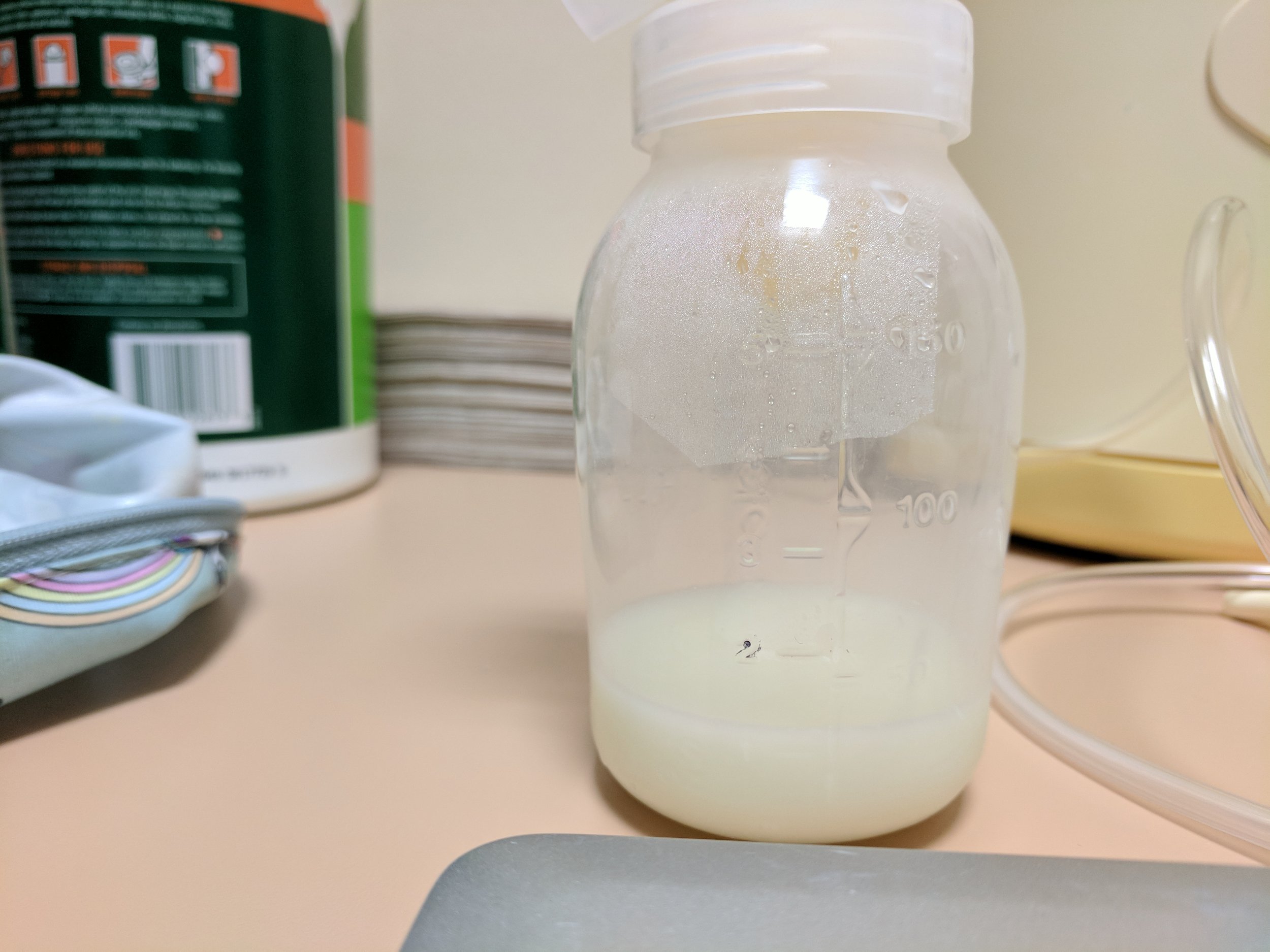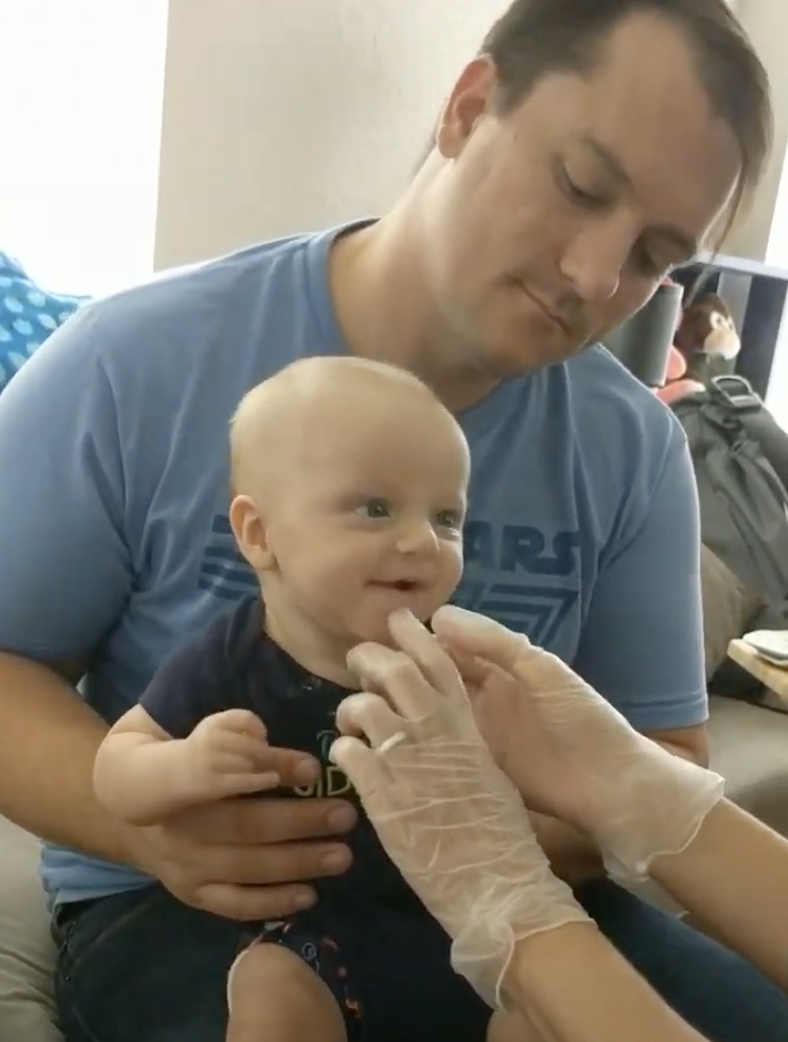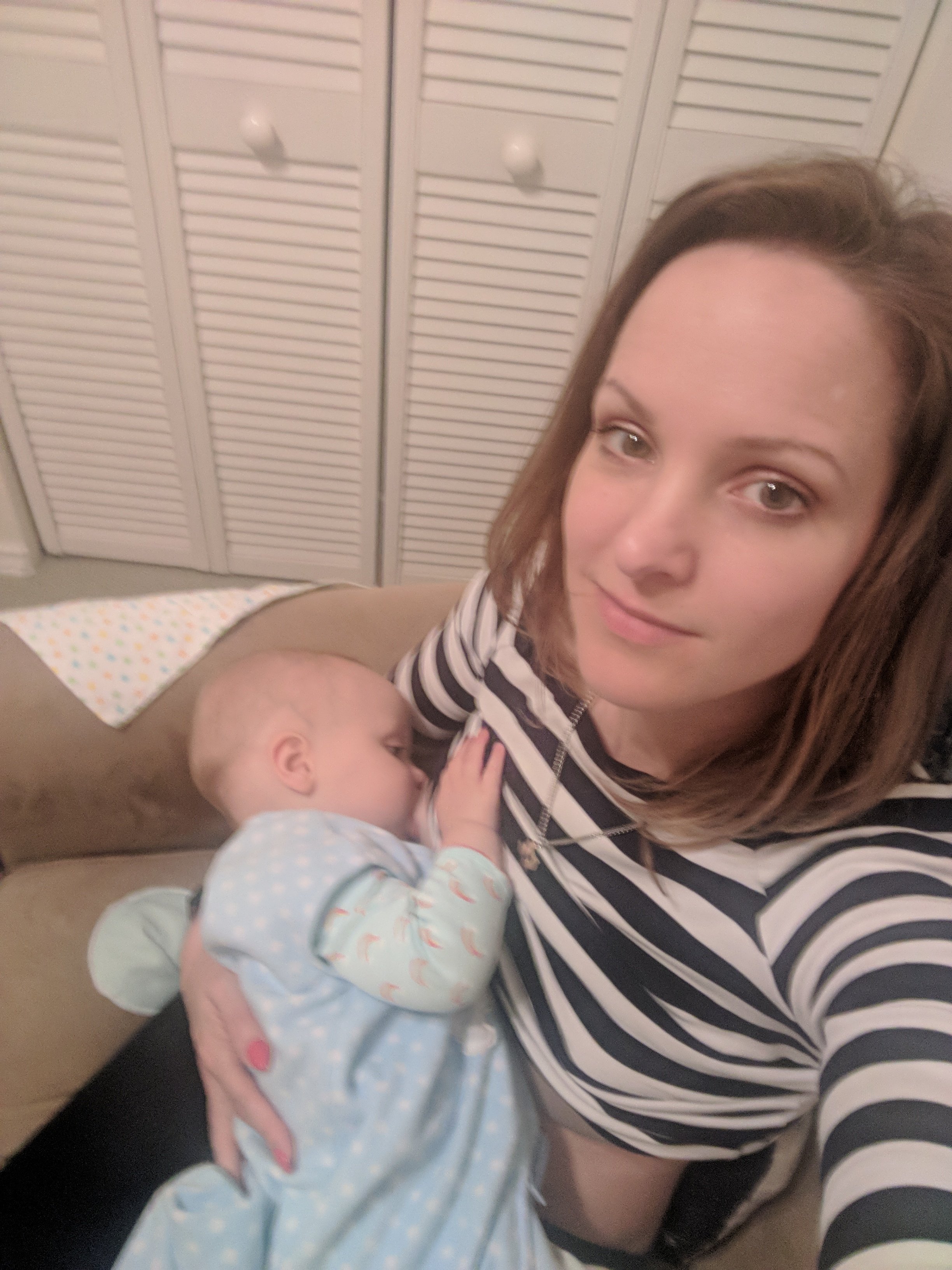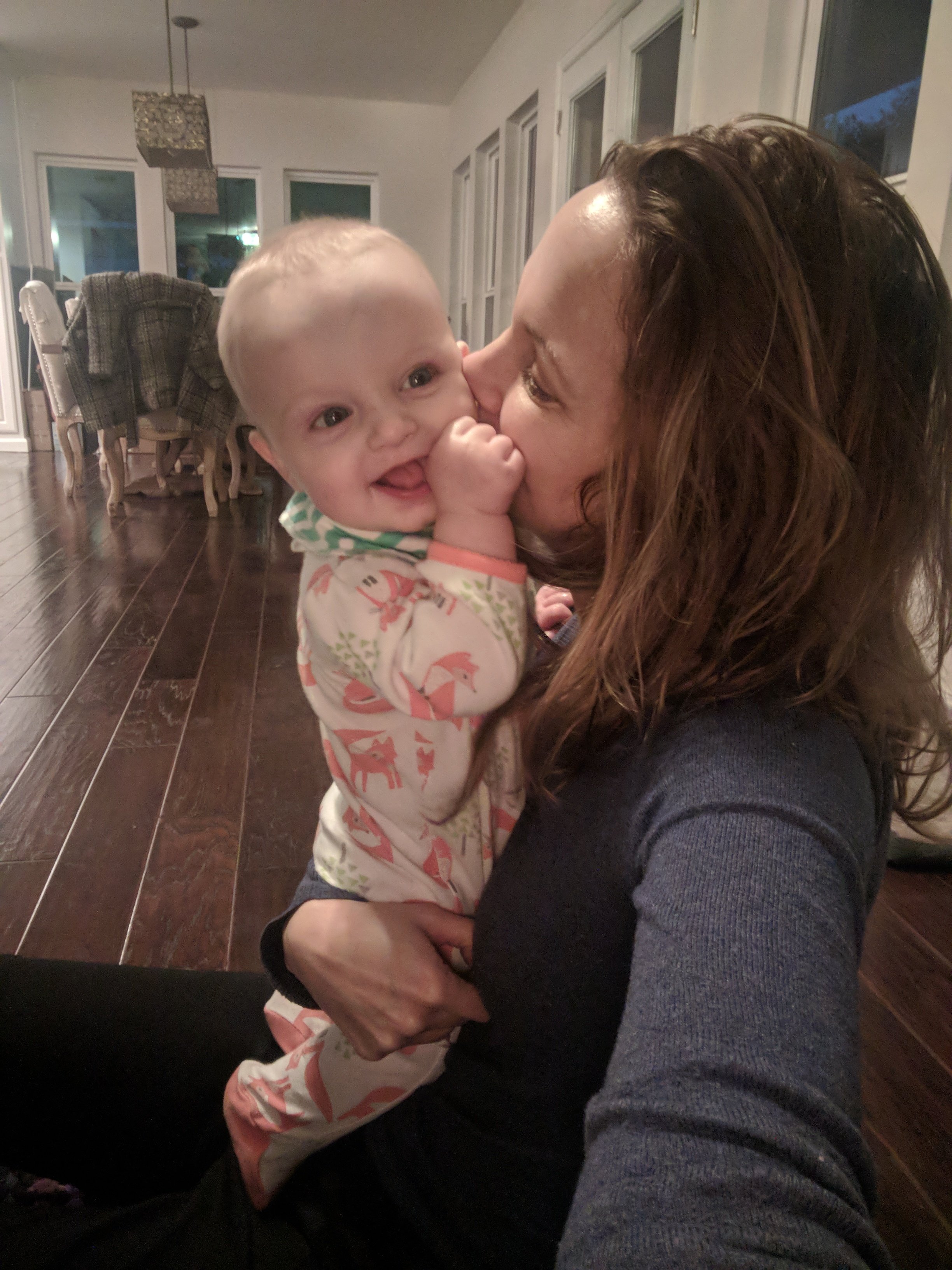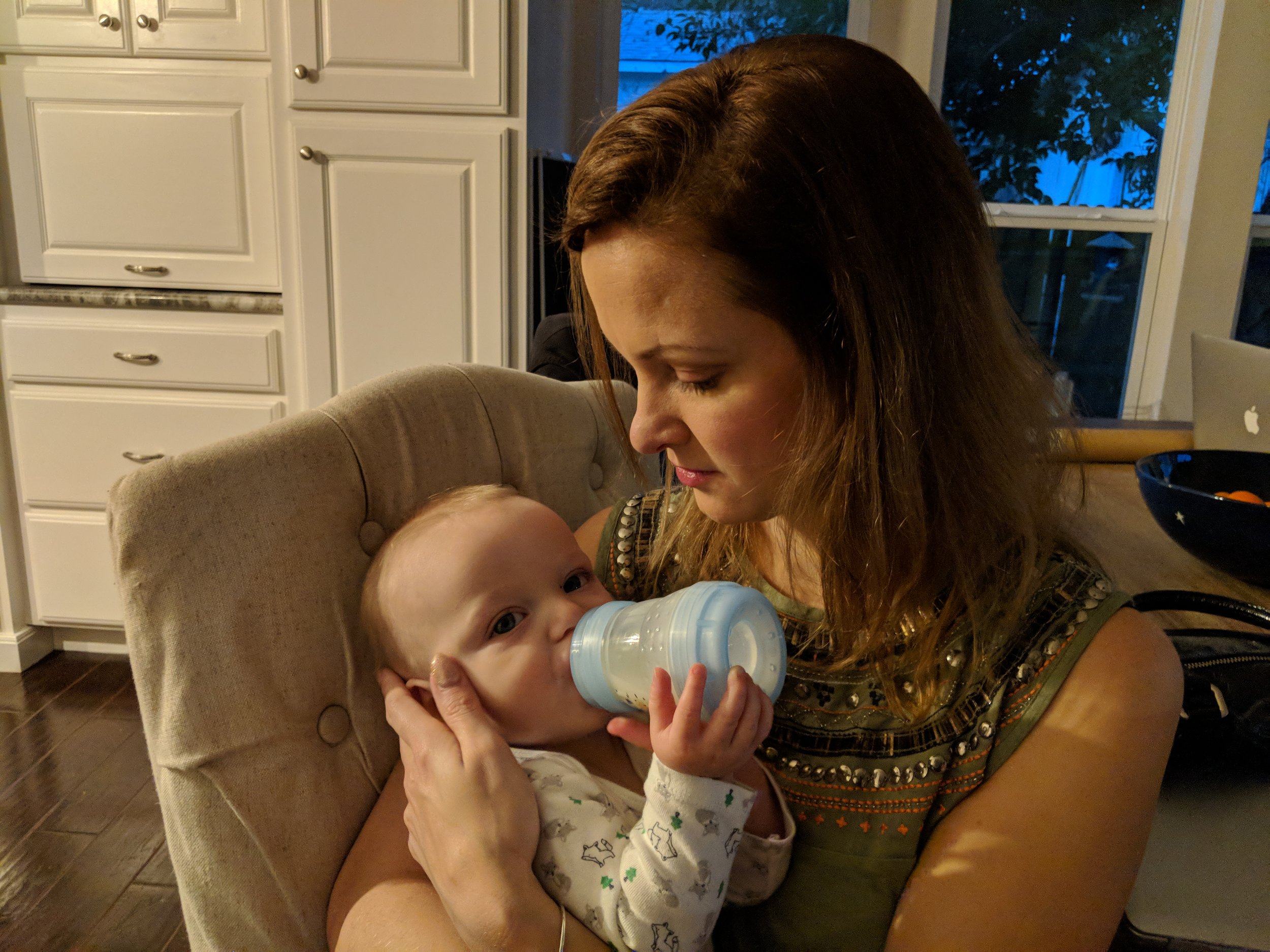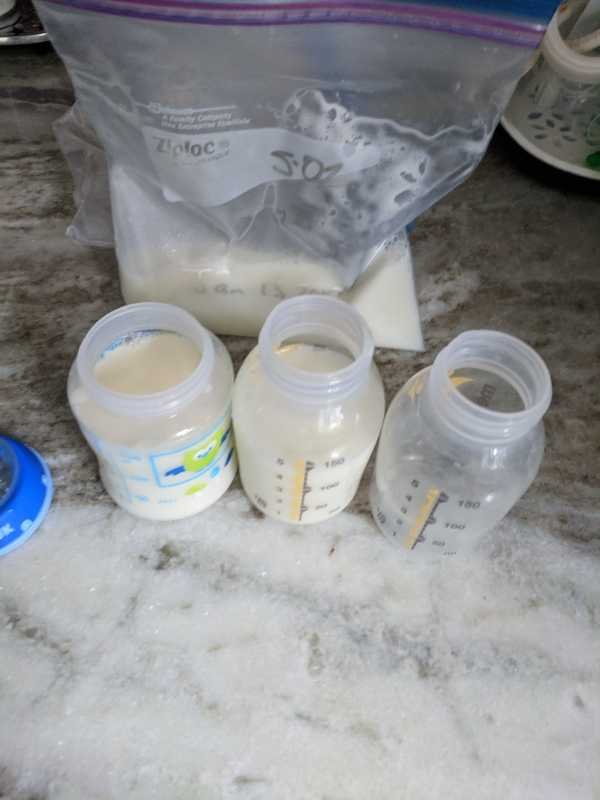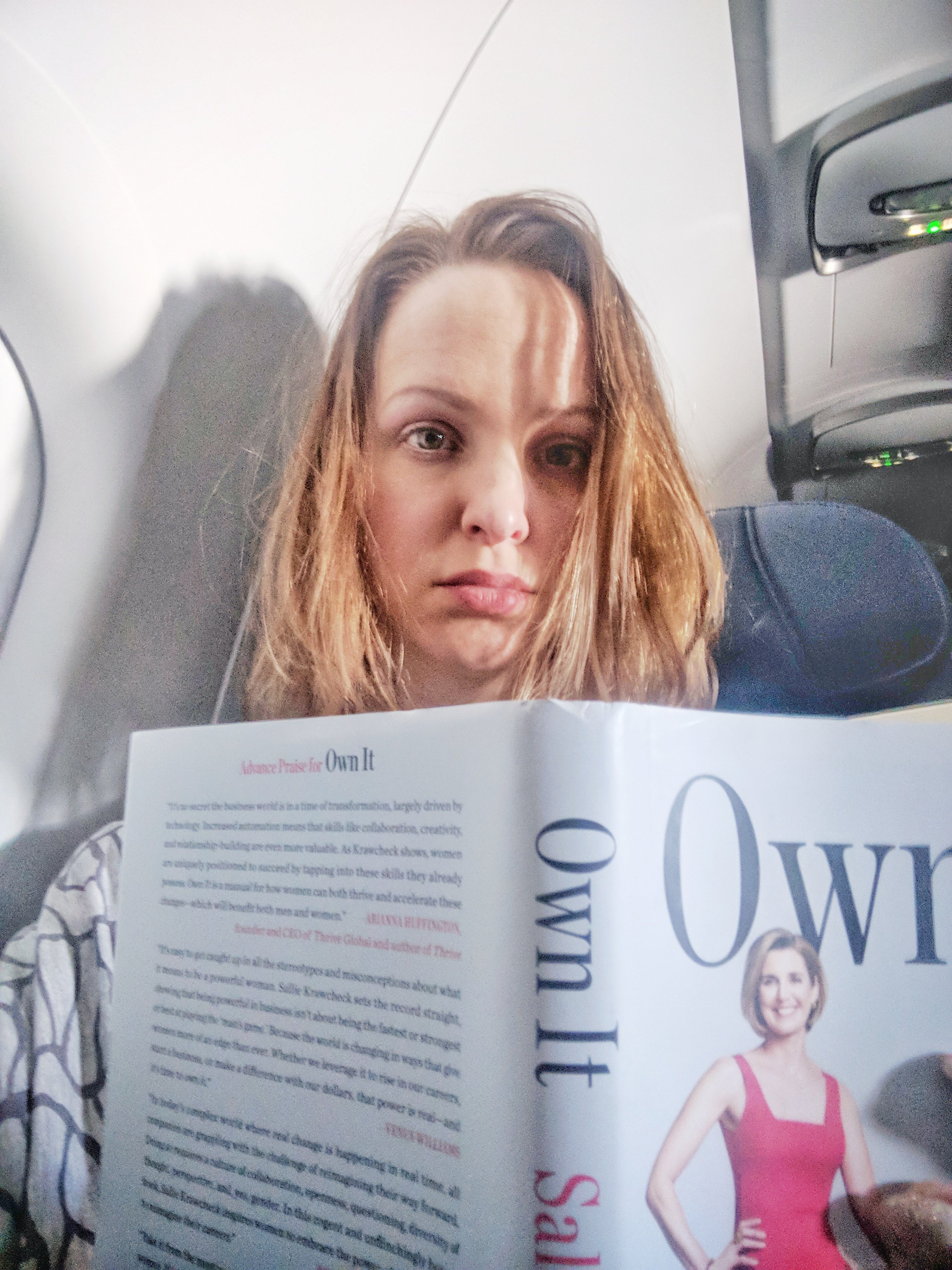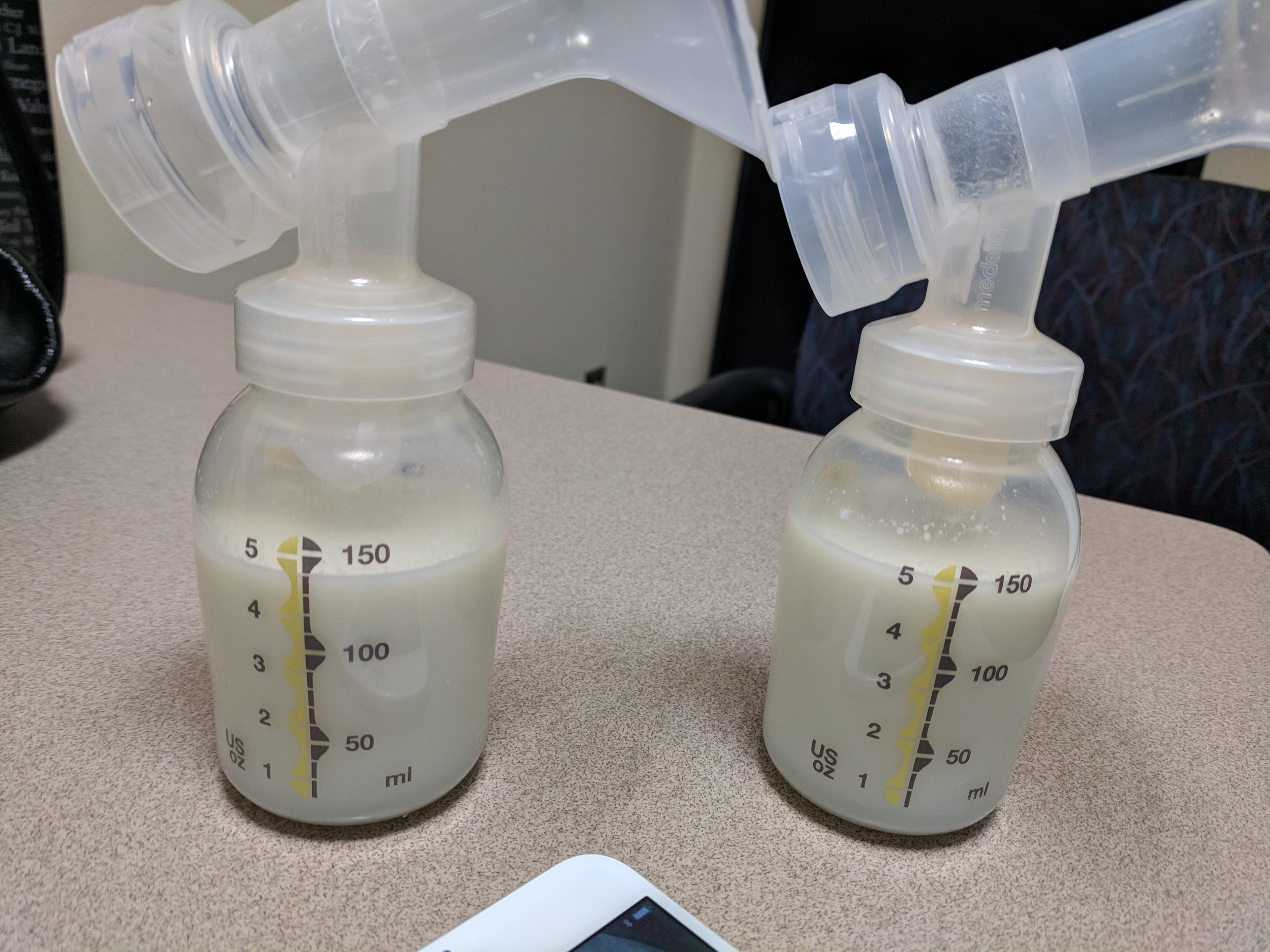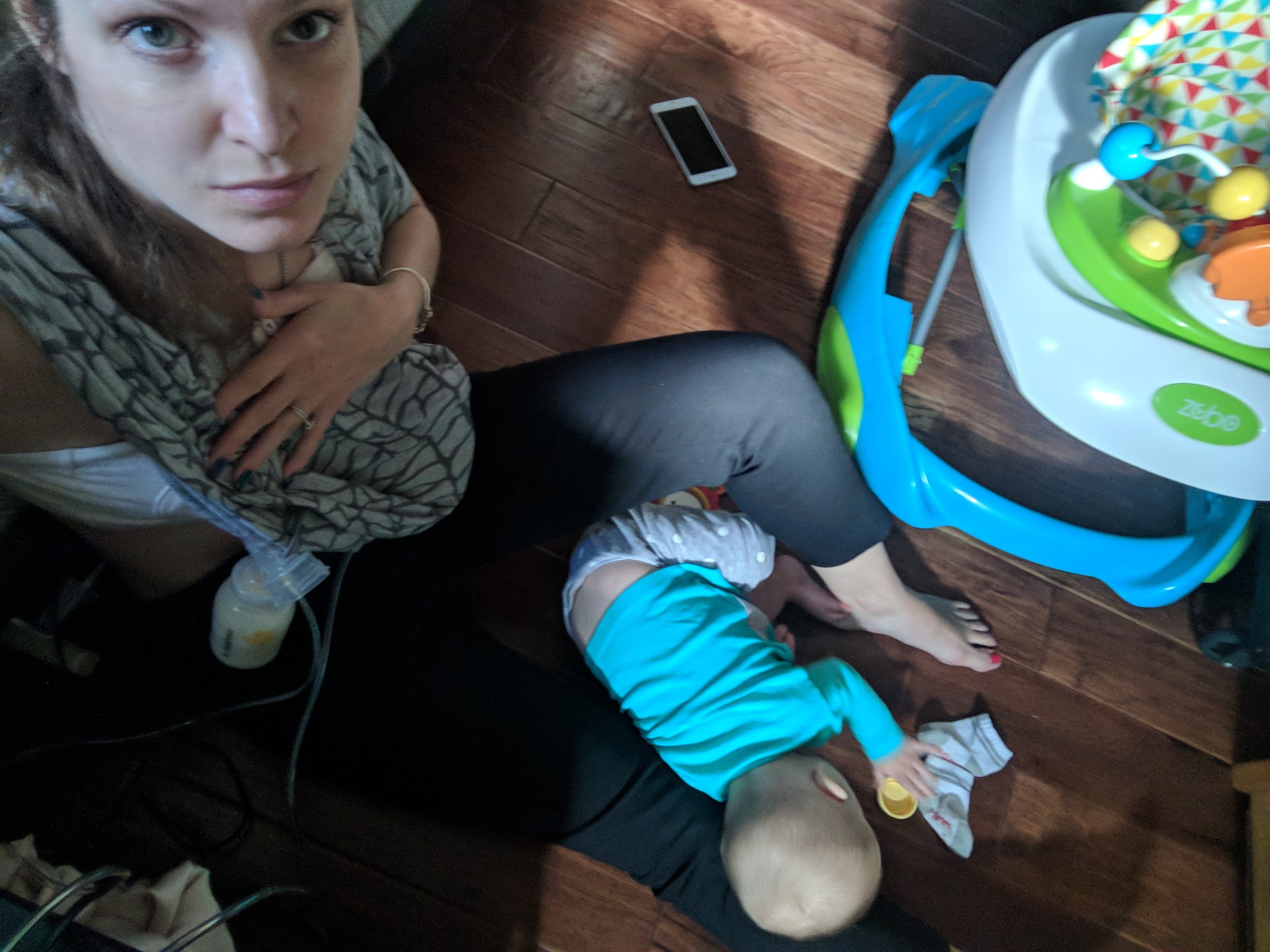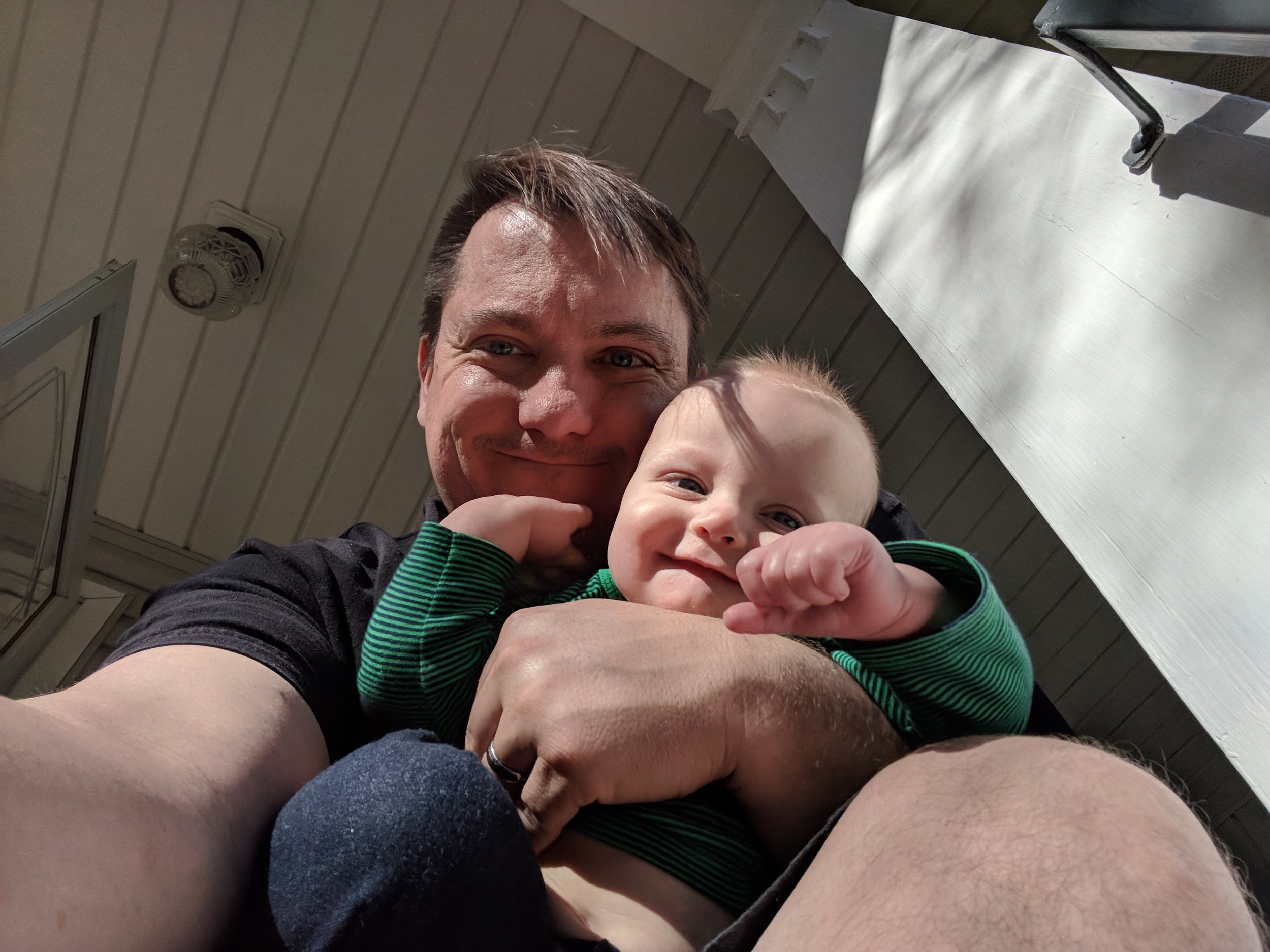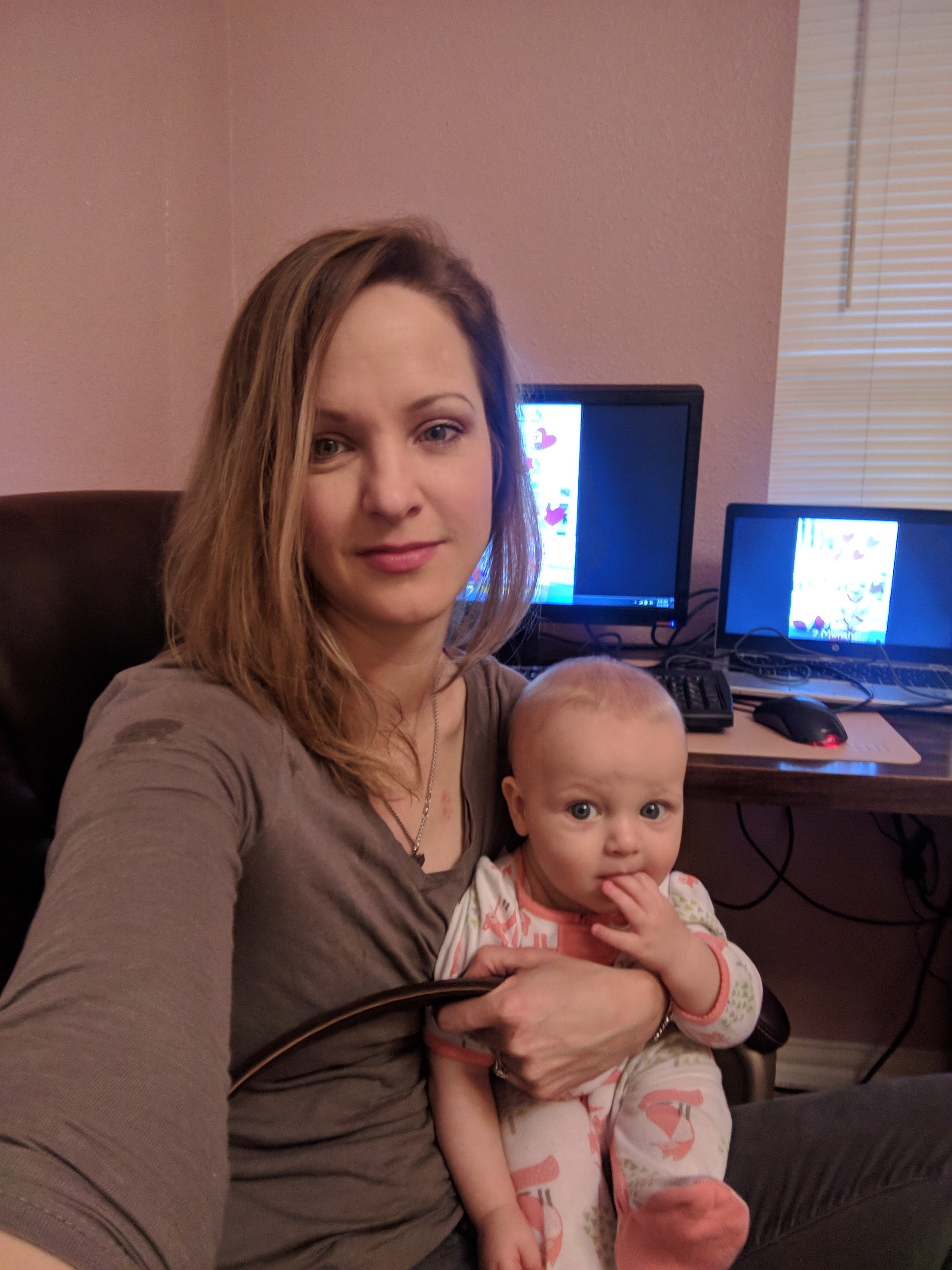My Breastfeeding Journey - Agony, Control and Surrender
By Vanessa Jupe
Holding my newborn, Roosevelt, after a nursing session.
“Take the baby now!” I practically screamed, holding my tiny baby out in the general direction of the living room where my father and husband were sitting. I'd been lying on the couch trying to nurse him, but the pain had become unbearable.
My dad looked at me, horrified, gently taking my son into his arms. In his straightforward wisdom, he said anything that made me feel this way toward my child couldn't be good and suggested I stop breastfeeding. Wouldn’t that be easier?
I don’t mind the easy route, but that doesn’t agree with my somewhat type A, black-and-white personality. I’ve worked hard to have a successful career, climbing the corporate ladder one rung at a time. Over the years, I've broken numerous barriers as a female leader. I've held executive positions leading large teams, managing multi-million dollar budgets, and driving positive business results. I've run long-distance races, spending hours laying down the miles and icing my knees. I've done hard things. But I didn't think that there was much out there harder than what I'd already done. Having a baby and trying to breastfeed him proved me wrong.
As a bit of a preface for the story, I can be obsessive and single-minded in my focus. The number of Google searches I’ve conducted, articles I've read, and consultants I’ve spoken with may be more than what an average person would do. My logical nature quickly went out the window with every mommy forum post I read and every conversation I had with a lactation consultant. Every one of them seemed to suggest that you're a terrible mother if you can't or don’t breastfeed. But, of course, they usually didn't explicitly say that. Their constant encouragement to not give up despite the pain and suffering certainly made me feel that way on top of all of the comments espousing the benefits of breastmilk, including its impact on a baby’s IQ!, and the ceaseless “breast is best” mantras. I couldn’t condemn my child to a life of below-average intelligence riddled with health problems just because breastfeeding hurt me physically and mentally; now could I? How selfish would that be!
Let's go back to the beginning, shall we?
Expectations vs. reality. It can be hard to reconcile the two… Like so many others in my generation, I was formula-fed growing up. I think I’m a relatively intelligent and healthy person. I don’t think being formula-fed caused me harm, so I believed that if breastfeeding didn’t come naturally to me, I’d be perfectly fine with formula-feeding my baby. I honestly didn’t know what I was up against.
I had a home birth, and it was terrific. As excruciating as the delivery was, the pain immediately disappeared after he was born. He latched onto my breast, and the midwife and her assistant thought everything looked good. I fed him every few hours day and night just as they told me to. A few days later, when it was time for his checkup, they said he hadn’t returned to his birth weight. But they weren't too worried at the time.
When we took our son in for his one-week check-up, I could see the nervousness in my midwife’s eyes. She said it's normal for babies to lose a little weight after birth but that I should meet with a lactation consultant.
Enter the Lactation Consultant
The lactation consultant came to my house and asked me to nurse in front of her. I was shocked by that, even though it made sense that she’d need to see how I was feeding my baby! It’s so strange to go our entire lives trying to hide our bodies from prying eyes, but when we have a baby, all of that goes out the window. I think I spent the entire first two months of motherhood topless.
This particular International Board Certified Lactation Consultant (IBCLC) was very anti-formula, which she discussed during our first meeting. She felt the formula companies were out to get her and others like her. She even accused them of vandalizing her car, which still seems far-fetched.
During the visit, she did what’s called a weigh-feed-weigh. The consultant first weighed the baby, then I nursed him, and then she weighed him again. She quickly determined he wasn't transferring enough liquid. She asked me to start pumping milk and showed me some tips for encouraging my breasts to produce more milk (massage anyone?). She observed my milk production and said it was a little below average. She recommended I nurse my son every two hours for 20 minutes on each side and then pump for ten minutes afterward.
I followed this protocol for a couple of days, and my baby started gaining weight, although more slowly than he should have. I felt like all I did was live in pain, nurse, pump, and clean parts.
As the pain in my nipples and breasts became more severe, it didn't occur to me that it could be from my baby’s latch. Instead, I felt confident it was because of the breast pump since the timing coincided with when I began pumping in addition to nursing. I incorrectly assumed I had the wrong size flange and confidently told my lactation consultant that this was the problem. She told me to order other sizes. (Spoiler: The original flanges were the correct size. Oops.) While the pain lessened a little since the size was much larger and, therefore, my nipples were rubbing less against the sides of the flange, it didn't go away.
Tongue-Tied and Lip-Tied
Roosevelt, getting his lip and tongue ties revised in the dentist's office.
Our IBCLC suggested our son may have a lip and tongue tie. She couldn’t diagnose that herself but recommended specialists in the area. She believed that if we revised the ties, my son would be able to transfer milk easily, and my pain would go away.
Getting these ties revised essentially means a doctor laser cuts the tissue away from your baby’s lip and tongue so that he has more range of movement and can presumably extract milk better from the breast. Moving forward with this procedure was difficult as I felt my baby was perfect, and I didn’t want to change him. However, I was so hopeful that it would improve our breastfeeding situation that my husband and I decided to do it. There were plenty of success stories out there, so why should mine be any different?
Worse than the initial cutting were the exercises my husband had to do every day to keep the baby’s tissue from regrowing. I couldn't do it. I hated even watching my husband do it. Our little one would cry and cry. I am sure it scarred my husband having to perform this procedure. Unfortunately, my son and I were a rare diad that even this procedure didn't help. Even after this, my son was not transferring enough milk, and my breast pain persisted. My husband and I bought a specialty scale to understand how much milk our baby was transferring because, for some reason, simply monitoring his weight gain wasn’t enough for me. Around this time, my midwife and IBCLC decided I needed to supplement with formula.
Enter Formula
Roosevelt gets his first bottle of formula.
I remember sobbing in the formula aisle as we tried to find something good for him. I was so deeply ashamed of myself and felt like a total failure as a mother. Isn’t breastfeeding supposed to be easy and natural? Isn’t this supposed to be something that we, as women, as mothers, do? I always felt embarrassed of my small breasts growing up, and I was certain they were the cause of my downfall now. (I have since learned this is likely not the culprit, that our breasts change dramatically during pregnancy, and that breast size does not equate to breast function. But at the time, it fed my self-shame narrative well.)
Fortunately, after we picked up the formula, we swung by our friends’ business, a computer repair shop in San Antonio. Our friend took the formula from me without even thinking. She mixed it up and gave it to our baby as if it was the most normal and natural thing in the world. I was so relieved that it wasn't even a conversation topic. I was also relieved that I wasn’t the one that had to give him the first bottle of formula. She did it effortlessly, and even better, our baby was happy. After this, my husband and I researched all kinds of formulas and settled on a brand from Switzerland named Holle. They had great reviews, the formula was fully organic, and the cows were fed on excellent grass.
Thrush and Vasospasm
Every time I attempted to nurse my son, the pain got worse. It felt like needles were stabbing into my breasts when I nursed him, and the sensation would sometimes last for an hour or more after the nursing session ended. The pain never completely went away. Finally, my lactation consultant told me that it had to be thrush and that I should get something called gentian violet to put on it.
For those of you that don’t know what thrush is, allow me to enlighten you. Thrush is essentially a yeast infection of the breast! And it can infect the baby’s mouth as well, which can be incredibly painful for them. Can you imagine how completely disgusting I felt thinking I’d gotten a yeast infection in my boobs? And that I had given this to my baby? And that simply breastfeeding meant we’d pass thrush back and forth to each other forever?! Talk about a nightmare! I suffer from anxiety as it is, and this was way too much to handle. I cried, my baby cried, my husband was his usual mellow self, and we treated ourselves with this medication. I even treated myself for a vaginal yeast infection, fearing it would spread.
Roosevelt with purple lips from Gentian Violet.
Gentian violet is a beautiful purple color. You swab it onto your nipples and then nurse your baby. It’s supposed to treat both of you simultaneously. And this purple crap stains… It stains skin, and it stains clothes. When I see photos of my beautiful newborn with purple lips, it still hurts my heart and makes me feel like an idiot. Because guess what? It didn’t help me. In hindsight, I am sure I didn’t have thrush.
On top of this, my midwife recommended a medication that a well-known breastfeeding-focused doctor in Canada invented: All Purpose Nipple Ointment (APNO) or “triple nipple cream.” I had to drive across town to a special compounding pharmacy that would make it for me.
If you’re wondering what is in APNO, you can think of it the way I did as a super weapon that would cure all ills, ensure breastfeeding would work and guarantee I would never get “thrush” again. It included an antibiotic to prevent and stop the growth of bacteria, an anti-inflammatory to ease nipple pain by reducing any swelling caused by injury, infection, or skin irritation, and an anti-fungal to fight off Candida, the yeast that causes thrush. I used this stuff religiously for six months or more.
To take things to a crazier extreme, I hired a speech therapist to come to our house and do exercises with our baby. She worked with his tongue and mouth to improve his suck reflexes. She visited frequently and taught us how to practice with him when she wasn’t there. At least he enjoyed those exercises and her visits, even though his suck never really improved.
At some point, I spoke to another IBCLC who told me I was likely experiencing vasospasm and recommended other nursing positions or simply pumping. Eventually, I acquiesced and became an almost exclusive pumper. I would sometimes nurse my son at night for closeness and to help him fall asleep. I loved those moments when he would play with my necklace as I was nursing him. But breastfeeding him was not without punishment.
Milk Blisters and Clogged Ducts
It often led to nipple blebs, AKA milk blisters on your nipples. These blisters led to clogged milk ducts which caused swelling in my breasts because the milk couldn’t get out. As a result, my breasts become super tender and sore. Even worse, if you can’t get the clog out fast enough, this can lead to mastitis! Unfortunately, I had blisters and clogged ducts over and over again. Fortunately, I never had mastitis. I guess I lucked out after all!
There’s nothing quite like getting a clogged duct and having a full day of work and meetings ahead of you. You know you’ll be distracted and in pain all day long. The anxiety and fear are constant as you pray you can get rid of the clog when you get home and not have it become infected. After numerous blisters, I finally realized the main thing that helped me rid myself of them was sanitizing a needle and sticking it through the blister and into the milk duct. Yeah, that was as awesome as it sounds.
One of the last experts I visited was a well-known and highly respected OBGYN. She was kind enough to meet with me even though I wasn't pregnant. I just wanted to speak with a doctor specializing in women’s bodies. Breasts, however, were not her specialty. After I shared my breastfeeding struggles with her, she told me matter-of-factly that I should be thankful we live in a time that babies don’t rely on breastmilk to survive. Instead, we can give them formula, and they thrive just fine. Logically, of course, this makes sense. From a doctor's perspective that was about to go into surgery, I am sure my concerns were the least of hers.
My breastfeeding journey brought on intense feelings of shame, inadequacy, frustration, and despair, which were undoubtedly exacerbated by lack of sleep and the constant fear of keeping my child alive as a new mom. To this day, it’s still the hardest thing I've done.
Like all of our stories, mine should have a positive ending. And while I can’t sugarcoat any part of my breastfeeding journey, I can say that this deep and extended suffering led me to start Leva. I want to help other women and mothers. I want to try to remove the guilt and shame from the equation, so mothers can make more informed decisions that are better for them. And I want to put as much scientific information in the hands of mothers as I possibly can.
For me, there was always more information I wished I had known. As I mentioned, I combo-fed my baby for his first year of life, and I really couldn't find information that helped me understand what amount of breastmilk was “good enough.” Was one drop of breast milk good? 1 oz? Was there a saturation point after which it didn't matter anymore? Or was it all or nothing? Wouldn’t it be helpful for mothers if they could definitively know whether they’d be good milk producers? Wouldn’t it help them to know precisely when and for how long to pump, depending on their breast size and hydration levels? These are the questions that burned and tugged at my soul.
As women and mothers, we deserve better. We deserve the best. So with my money, energy, time, and resources, I have dedicated myself and my team to answering those questions and getting information into the hands of moms when they need it most.


